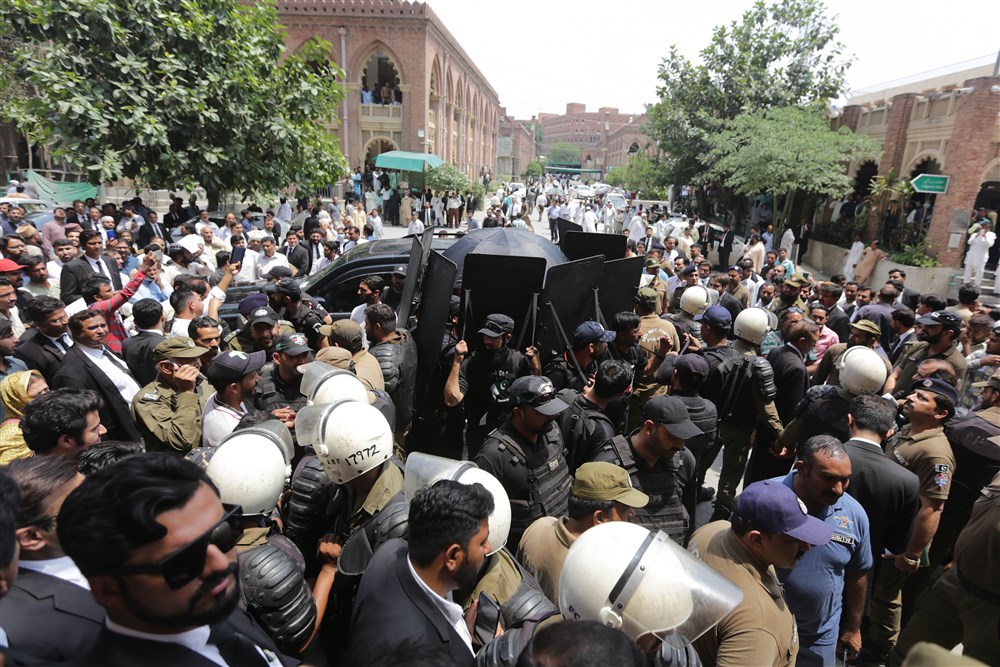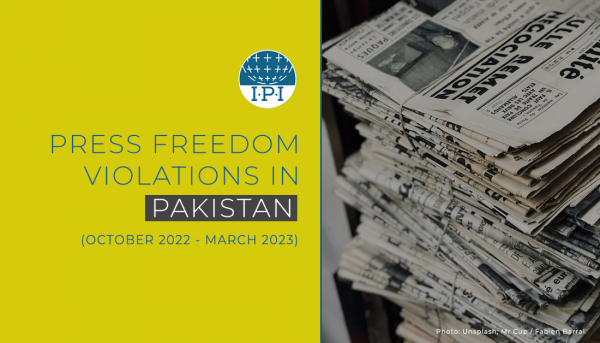The IPI global network today published an open letter to Prime Minister Shehbaz Sharif expressing concerns about the state of press freedom in Pakistan and urging his government to take immediate and concrete action to protect and respect press freedom and to ensure that the Pakistani public can exercise their fundamental right to receive diverse, independent news and information.
IPI is especially concerned about the wave of attacks on the media in recent weeks, amid nationwide protests following the arrest of former prime minister Imran Khan on May 9. Documented attacks have included violence against journalists and media houses, arrests of journalists, and an unprecedented nationwide shutdown of the communications and information networks that have deprived citizens of critical access to information, which is essential to public safety during times of crisis and unrest.
The letter highlights some of the key challenges journalists in Pakistan face in being able to carry out their work freely and safely, based on more than a year of close monitoring by IPI as part of our ongoing work to support press freedom and independent journalism in the country and across South Asia. It also includes a series of concrete recommendations for improving the environment for press freedom in Pakistan and for ensuring the Pakistani public has access to diverse, independent news and information.
The letter can be read in full below or downloaded here.
—
31 May 2023
Your Excellency Mr. Shehbaz Sharif, Prime Minister of Pakistan,
As the global network of editors and journalists dedicated to promoting media freedom and independent journalism, the International Press Institute (IPI) is gravely concerned about the deterioration of press freedom in Pakistan.
We are especially alarmed by the escalation of attacks on the media in recent weeks, amid nationwide protests following the arrest of Pakistan’s former prime minister Imran Khan on May 9. Documented attacks have included violence against journalists and media houses, arrests of journalists, and an unprecedented nationwide shutdown of the communications and information networks that have deprived citizens of critical access to information, which is essential to public safety during times of crisis and unrest.
We call on your government to take immediate and concrete action to protect and respect press freedom and to ensure that the Pakistani public can exercise their fundamental right to receive diverse, independent news and information.
These recent attacks come amid an already challenging environment for press freedom in Pakistan. IPI monitoring shows that journalists are often subjected to physical attacks, death threats, online harassment, as well as arrests, and judicial harassment and intimidation.
IPI has documented at least 73 press freedom threats or violations over the past year, which includes both legal and physical attacks against journalists. Our monitoring also shows that most of these incidents and violations involved public officials or authorities, which include law enforcement and judicial authorities, precisely the public officials and institutions that are responsible for safeguarding fundamental human rights and the rule of law.
We highlight:
- The escalation of government pressure on journalists amid tightening control over the news and information landscape during times of political crisis, protests, and elections.
- The use of network shutdowns as a tactic for censoring and silencing news and information. This has included ordering intermittent shutdowns of social media, along with shutdowns of mobile services, as a tool for censoring news and information, particularly during times of heightened political expression and protest.
- The use of “lawfare” against journalists who express critical views of government policies or expose corruption by government officials. We are especially concerned by your government’s use of the Prevention of Electronic Crimes Act and the Pakistan criminal code to intimidate critical media and weaken independent journalism in Pakistan.
- The government’s efforts to advance new proposals granting authorities broad powers to silence any criticism of government policies and all forms of dissenting views, including the proposed amendment to the Federal Investigation Agency Act, 1974, and the government’s proposed Criminal Laws (Amendment) Act, 2023. If passed, these measures would criminalize criticism of state institutions, the military, and the judiciary.
- Violence and attacks against journalists covering protests or political elections. Over the past year, IPI has documented at least 38 cases of physical, verbal, or online attacks against journalists. Many of these occurred while covering political rallies. On October 30, 2022, Channel 5 reporter Sadaf Naeem died after being run over by the container that was carrying former prime minister Imran Khan during his long march in Sadhoke, Punjab. This highlights the unsafe working environment for journalists in Pakistan, especially for journalists covering public rallies or political events.
The right to free speech and a free press is enshrined in the Constitution of the Islamic Republic of Pakistan. Yet, in practice, these protections have been weakened by attacks on the press and additional laws and provisions in the criminal code that directly threaten and criminalize the exercise of these rights. The government must ensure that all policies and practices affecting the media align with domestic and international protections for press freedom and respect the Pakistani public’s right to diverse, independent information.
We emphasize that under international law states have a positive obligation to protect the fundamental rights to freedom of expression and information, which includes the right of journalists to work freely, safely, and independently. Any interference with the right to freedom of expression should be prescribed by law and must be necessary, legitimate, and for a narrowly defined purpose.
Moreover, under international law and other agreements, states must investigate attacks on journalists promptly, thoroughly, and independently, and prosecute those responsible. Our work and research have shown that failure by states to investigate such crimes often leads to increased violence.
We therefore call on your government to:
- Cease attacks on the media covering the current political protests. Journalists must be able to do their work freely and safely. This includes covering events of public interest, such as political protests, political rallies, and elections.
- #KeepItOn: Refrain from ordering network shutdowns or any disruptions to online and digital communications platforms, and services. Access to the internet is regarded as a human right. Any restrictions to this right can only be justified in the narrowest of circumstances and must be proportionate to achieve the desired aim. The UN and human rights experts have found that the intentional disruption of internet access and digital communications in almost no circumstances meets this proportionality test. This includes intentional network shutdowns or disruptions during times of political activity or protest.
- Cease “lawfare” against the press. The government should immediately cease its abuse of the law to punish and harass journalists and independent media in Pakistan. The weaponization of law to target journalists undermines domestic protections for press freedom and threatens the foundations of international human rights principles and frameworks.
- Conduct transparent and thorough human rights risk assessments on any new and existing legislation that may affect freedom of the press and access to information, in consultation with domestic and international stakeholders to ensure alignment with domestic and international laws protecting press freedom. We strongly urge your government to work in consultation with civil society and human rights experts to review the relevant human rights risks of the proposed amendment to the Federal Investigation Agency Act, 1974 and the government’s proposed Criminal Laws (Amendment) Act, 2023.
- Repeal all domestic legislation or legal provisions in existing laws that contravene domestic and international protections for media freedom and the right to information. This should include repealing criminal defamation and sedition laws, as well as all provisions of the Prevention of Electronic Crimes Act (PECA) that can be used to silence critical media and weaken independent journalism.
- Commit to protecting journalists’ safety, reducing violence against the media, and ensuring all crimes against journalists and media workers are investigated transparently and independently. This can be achieved through the effective implementation of the federal-level media safety law (the Protection of Journalists and Media Professionals Act, 2021) as well as the provincial-level Sindh Protection of Journalists and Other Media Practitioners Act 2021. The government should ensure the immediate formation of the Commission for the Protection of Journalists and Other Media Professionals, as required under the federal-level Protection of Journalists and Media Professionals Act 2021.
The need for quality, public-interest journalism in Pakistan and around the world has never been greater. IPI stands ready to discuss our concerns and our recommendations for strengthening the environment for media freedom in Pakistan and for ensuring that independent journalism can fulfill its critical public function of helping foster a more democratic, informed, and equitable society.



